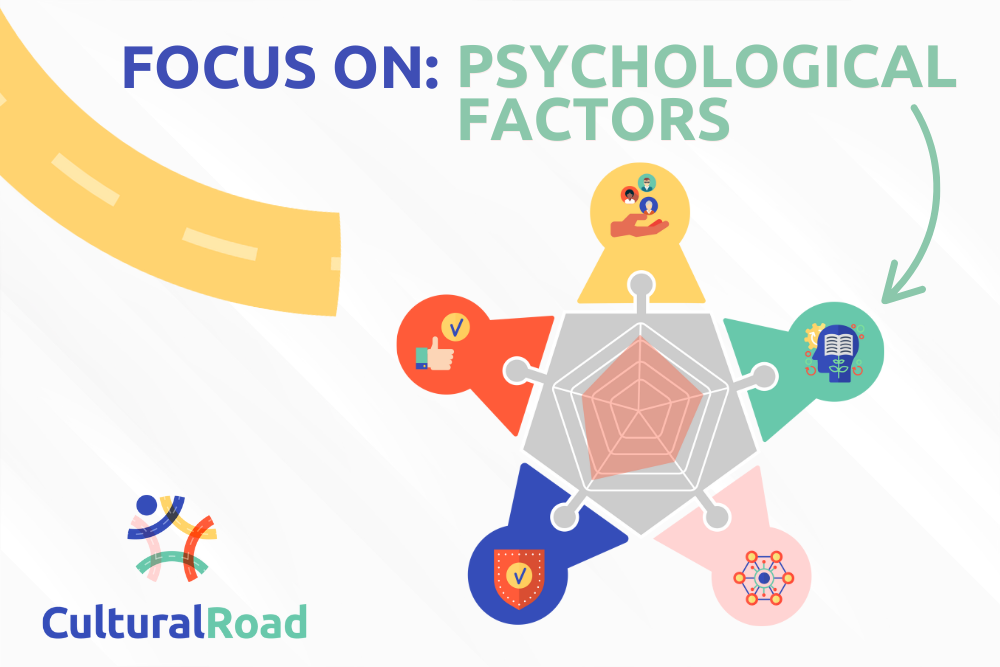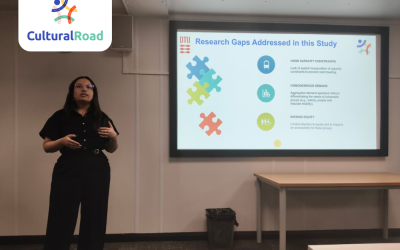In this final article of the series exploring the CulturalRoad pillars of mobility equity, we turn to the human side. Which psychological factors influence people’s willingness to adopt Connected, Cooperative and Automated Mobility (CCAM) solutions? The Psychological Factors pillar investigates these factors to ensure that future transport systems are both accessible and trusted.
The CulturalRoad Psychological Factors pillar delves into the human mindset, exploring the cognitive, emotional, and behavioural responses that shape how individuals perceive and engage with emerging mobility technologies. Whereas the Acceptance pillar examines whether people are willing to adopt CCAM services, this pillar focuses on understanding the reasons behind that decision. It seeks to uncover the underlying psychological drivers and barriers, such as fear of automation, low trust in autonomous systems, or discomfort with relinquishing control, and examines how these factors vary across different populations and regions. By understanding how individuals perceive and relate to these technologies, the research ensures that future mobility systems are not only technically robust but also socially inclusive, emotionally accessible, and aligned with the needs of diverse user groups.
What are psychological factors in mobility?
Psychological factors in mobility refer to the emotional, cognitive, and dispositional variables that influence how individuals perceive, evaluate, and adopt new transport solutions. In the context of CCAM, these factors include trust in automation, fear of technological systems (technophobia), and the importance placed on personal ownership, as well as broader attitudes, intentions, and personality traits such as routine-seeking behaviour, emotionality, and extraversion.
Research shows that fundamental psychological dispositions, such as environmental identity or psychological ownership, significantly shape perceptions of new mobility services. These factors influence how safe, compatible, or controllable CCAM appears in everyday life. Additionally, innovation-specific characteristics, like openness to change or perceived ease of use, can be more predictive of behaviour than demographic or infrastructural variables alone.
Understanding these psychological influences is essential, as many barriers to CCAM adoption are not technical but rooted in perception and emotion. By accounting for these human aspects, CulturalRoad ensures that CCAM is not only functionally accessible but also trusted, accepted, and embraced by diverse communities.
Research focus and approach
Led by the Technical University of Denmark (DTU), the work on the Psychological Factors pillar is anchored in a doctoral research project. The research is carried out in close collaboration with the Technical University of Munich (TUM), who is leading the Acceptance pillar.
The research investigates various psychological traits and dispositions that influence the adoption of CCAM, including:
- Affinity for technology, which refers to an individual’s enthusiasm for and confidence in engaging with new technologies. Individuals with high technology affinity are generally more receptive to automated mobility, while those with low affinity may experience hesitation or resistance. This dimension also encompasses elements of technophobia, the fear or aversion to unfamiliar or autonomous technologies, which can discourage usage even when services are readily available.
- Trust in automation, which is understood as the belief that automated systems are competent, safe, and reliable. Trust plays a central role in determining whether users feel comfortable relying on CCAM services.
- Perceived safety and control, which relates to the extent to which individuals feel physically secure and psychologically at ease when using automated transport. Feelings of vulnerability or loss of control can significantly reduce willingness to engage with such systems.
- Personality traits, such as Extraversion (associated with sociability and openness to new experiences) and Emotionality (linked to anxiety and risk sensitivity), may influence how individuals evaluate and respond to new mobility options.
These psychological factors are examined across diverse demographic and cultural contexts, acknowledging that attitudes toward technology and automation are shaped not only by individual experience but also by socio-economic conditions and country-specific influences. This approach allows for a more comprehensive understanding of the barriers and enablers that affect equitable CCAM adoption.
“The most important contribution of the Psychological Factors pillar is its capacity to reveal cognitive and emotional barriers and enablers that shape public engagement with automated mobility. By examining how trust in automation, technology affinity, and perceived control are influenced by socio-economic conditions, cultural norms, and country-specific contexts, this research moves beyond surface-level attitudes to offer a deeper understanding of user readiness. Identifying who feels empowered or excluded and why is essential for designing CCAM systems that are not only technologically sound but also socially inclusive and broadly accepted.” Guido Cantelmo, Associate Professor in Transport Modelling, Technical University of Denmark (DTU)
Methodological framework and next steps
The work on the Psychological Factors pillar follows a mixed-methods approach, beginning with a quantitative survey that assesses affinity for technology, trust in automation, and socio-cultural influences using the Theory of Planned Behaviour (TPB) and Technology Acceptance Model (TAM) frameworks. The survey examines how these factors relate to CCAM adoption intentions, considering country contexts and prior exposure to automation.
Findings will inform the design of focus groups and interviews conducted in the five CulturalRoad demonstration sites, enabling a deeper exploration of the psychological barriers and drivers influencing acceptance of CCAM.



